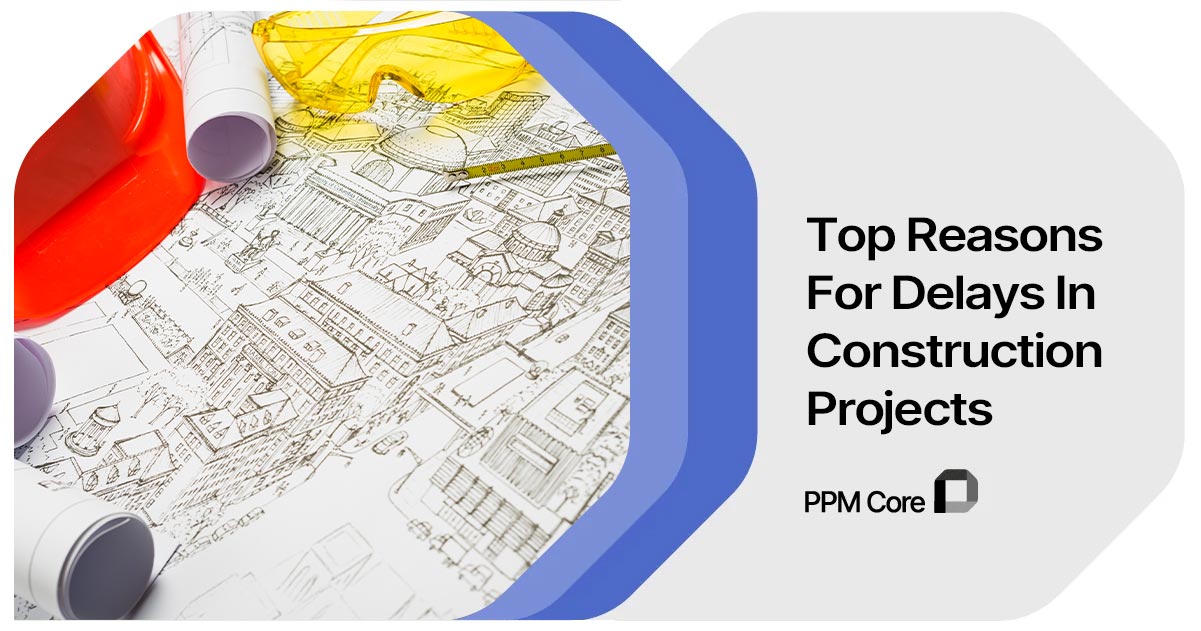Delays in construction projects are one of the most recurring issues challenging project managers.
Construction projects may regularly see disruptions, errors, and conflicts that interfere with the team’s ability to complete projects on time. Regardless of whether these delays happen at the hands of someone along the construction chain of command, or they’re completely out of human control, construction delays can significantly prolong the project lifecycle and with that increase the project expenses.
In this article, we will overview the most common reasons for delays in construction projects, while offering an overview of how to approach them.
Change in Project Scope
Delivering a project on time and within budget is a benchmark for success in construction, although it is very rarely achieved. This success is directly influenced by the project scope and how it’s being managed. From a financial perspective, expanding the scope requires more resources, which consequently means securing new funds or reallocating the budget. Additionally, an expanded scope means an extended timeframe, affecting the project schedule by adjusting the timelines and deliverables.
Project scope is the process of identifying and documenting a list of precise project goals, deliverables, tasks, costs, and deadlines. It defines the project’s boundaries, assigns tasks to each team member, and establishes methods for verifying and approving completed work.
While everybody wants a project delivered on time, construction often goes past its intended schedule, which can impact the financial side of the project. Simply put, more scope changes can lead to more unexpected delays and expenses.
One of the best ways to keep a project on schedule and within budget is to have a well-designed process before the project starts, which will anticipate most of the changes.
Impact of poor scope definition on project delays:
1 . Poor Scope definition can lead to a Scope creep
Scope creep refers to the tendency of a project’s scope to expand beyond its originally defined boundaries. This occurs when new tasks, requirements, or features are added to the project without proper consideration of their impact on the overall project scope, timeline, and budget. Scope creep can cause significant problems, including delays, increased costs, and decreased quality of work.
It can also lead to confusion among team members and stakeholders, frustration and disappointment when the project fails to meet its original objectives. To prevent scope creeping, it’s essential to establish a clear and comprehensive project scope statement, regularly review and update the scope, and ensure that all changes are properly documented and approved by relevant parties. By maintaining a tight grip on the project scope, teams can stay focused on delivering the agreed-upon outputs and avoid unnecessary deviations that can compromise the success of the project.
2. Project roles and responsibilities
The construction industry’s complexity often leads to unclear project roles and responsibilities.
This can result in several potential challenges, including:
- Schedule – Due dates get missed, resulting in scheduling delays
- Cost – Costs increase due to task duplication or late completion of previously missed tasks.
- Workload – The project manager or other project staff need to spend a lot more time than necessary tracking the status of key tasks and deliverables.
- Deliverables – Important tasks get overlooked as individuals (or contractors) are misguided that other parties are doing them
Project managers must ensure that team members understand what they are expected to do by providing defined responsibilities, clear descriptions of roles, and briefs on what they should be doing.
The end outcome should be less stress and costs, a more efficient timetable, and better project deliverables.
3. Handling changes
In construction, changes are inevitable. However, without a robust change management process in place, even small changes can cause big delays. Poorly defined project scope makes it difficult to assess the impact of changes on the project timeline, budget, and resources. This can lead to delays as project teams struggle to adjust plans, reallocate resources, and communicate changes effectively.
In summary, every project can be subject to modifications, and certain scope adjustments cannot be avoided. However, taking time in the early stages of the process and considering all options can be an effective way to avoid costly and time-consuming field revisions.
This approach could provide the flexibility to adapt to unexpected changes.
Project Complexity
The construction industry frequently encounters uncertainties during the management of complex projects. If they are not managed properly, these uncertainties may have a significant impact on the project’s success.
Given that there are so many variables involved in construction projects, the structural approach plays a vital role in how successful organizations respond to those challenges.
Challenges posed by complex construction projects:
1. Collaboration Challenges
Collaboration benefits everyone in construction, but it can also be challenging to implement.
That’s why the project participants need to have a better understanding that sharing knowledge and information between different teams is one of the key elements of a successful contractual relationship and achieving better results.
2. Technical difficulties
Complex projects often need smart solutions to tricky problems. These technical challenges can be hard to solve and need special skills, tools, and plans. Without the right skills and tools, things can go wrong, causing delays and mistakes.
3. Budget and Cost Challenges
Budget and cost difficulties can have a substantial impact on the project’s status.
The possible increase in material costs can have a direct influence on the whole project budget, making it difficult for construction companies to predict and manage their financial resources effectively without the right management solution.
4. Dealing with risks
Managing risks in construction projects can be a complicated process. Due to its complexity, an effective risk management system is required. As a result, project managers play an important role, and their main responsibilities are to limit, as much as possible, the exposure of the project to events that place it under threat in order to develop an environment where critical risks are overseen and to make sure that the project remains on track.

Do you find this article interesting?
Subscribe to our Newsletter for updates on the latest blog articles.
To do this, project managers must perform certain activities, along with their team, to:
- Anticipate and manage critical risks that put the project in jeopardy.
- Involve the members of the project team in reducing risks.
Consequences of inaccurate estimates:
Inaccurate estimates in construction projects can have several significant and interrelated consequences. We are talking about multiple consequences that happen in parallel or prolong over time, ranging from budget overruns and resource shortages to legal disputes. Taking all this into consideration, it’s fair to say that accurate estimates are crucial to ensuring financial viability, timely completion, and quality outcomes.
Inadequate Planning
Let’s dive into the importance of planning in construction projects, the consequences of inadequate planning, and how PPM Core can improve project planning:
Importance of planning in construction projects:
In construction projects, planning is crucial because it helps everyone know what needs to be done, when it needs to be done, and how much it will cost.
Planning helps teams work together smoothly, prevents mistakes, and keeps things on track.
Consequences of inadequate planning:
Without good planning, projects can run into all sorts of problems.
Deadlines might get missed, costs might spiral out of control, and mistakes might happen. Inadequate planning can lead to delays, budget overruns, and poor-quality work, which nobody wants.
How PPM Core Improves Project Management Processes
PPM Core provides a space where all schedules, regardless of the file format (mpp, xer, and other formats), can be seen in one place. It offers fast access to project information from anywhere, at any time, ultimately leading to the creation of an efficient working space where project-oriented teams can collaborate without organizational boundaries.
As we delve further, PPM Core can also assist in taking control of the financial aspects of your business. It focuses on making financial transactions easy, managing budgets comprehensively, and controlling costs effectively.
Improper Project Schedule
Let’s discuss the importance of project scheduling, the problems caused by improper scheduling, and how PPM Core features can enhance project scheduling:
Significance of project scheduling:
In construction projects, scheduling is crucial because it helps teams organize their work, set deadlines, and stay on track.
Scheduling helps teams manage their time efficiently, allocate resources effectively, and ensure that everything gets done on time. Without proper scheduling, projects can become chaotic, deadlines can be missed, and costs can skyrocket.
Problems caused by improper scheduling
In construction project management, avoiding scheduling mistakes is vital for on-time project delivery and successful outcomes; otherwise, it will lead to deadlines being missed, tasks overlapping, and resources being wasted.
Improper scheduling can cause delays, budget overruns, and conflicts among team members, which can derail the entire project.
Inaccurate Engineering Estimate
Role of engineering estimates in project budgeting
Engineering estimates are fundamental to project budgeting, serving as the foundation for financial planning. In construction projects, these estimates determine the anticipated costs of materials, labor, equipment, and overhead expenses. They provide a comprehensive roadmap for managing projects.
Inaccurate engineering estimates can have significant repercussions on project outcomes. Underestimating costs may lead to budget shortfalls, delays, and compromised quality, impacting project delivery. Conversely, overestimating costs can result in unnecessary financial burdens, inefficient resource allocation, and reduced competitiveness. Inaccurate estimates erode stakeholder confidence, strain client relationships, and undermine project success. It’s essential to ensure precision in cost estimation to maintain project integrity and financial viability.
Inefficient Material and Equipment Management
The role of material and equipment management in construction:
Effective material and equipment management are essential components of successful construction projects. Proper management ensures that the right materials and equipment are available when needed, optimizing productivity and minimizing downtime. Material and equipment management also contribute to cost control by minimizing waste and preventing unnecessary expenditures.
Overall, efficient management of materials and equipment is critical for maintaining project timelines, controlling costs, and delivering quality results.
Problems associated with inefficient management:
Inefficient material and equipment management can lead to many problems that hinder project progress and increase costs. For example, if materials are not ordered in advance or are delivered late, it can cause delays in construction activities, impacting project schedules. Similarly, poor inventory management can result in overstocking or stockouts, leading to wasted resources or delays in procurement. Additionally, inadequate maintenance of equipment can lead to breakdowns and downtime, further delaying project timelines. Inefficient management practices can also result in increased costs due to rework, expedited shipping, or penalties for missed deadlines. Overall, inefficient material and equipment management can jeopardize project success by undermining productivity, increasing costs, and compromising quality.
PPM Core for the construction industry
The construction industry is associated with complex projects and constantly shifting challenges.
PPM Core, a project portfolio management software, is designed to meet the needs of a variety of industries, including construction, with the high point of ensuring that your project meets deadlines and prevents overspending.
PPM Core’s features can help construction companies manage obstacles by providing efficient project management and precise scheduling, managing cost overruns, improving decision-making, and managing financial and budget limits in construction projects.
Conclusion
Delays in construction projects can cause many difficulties for the project managers. That’s why the importance of understanding, identifying, and providing a good solution for them must be imperative. Using the right tools can simplify this process and make every decision well-informed and accurate.
Taking everything into perspective, efficiently managing complexity in construction projects is crucial for success and preventing failure. This significantly impacts various aspects of the project, including human relations, resource allocation, budgeting, and risk management.

